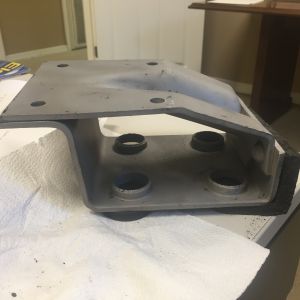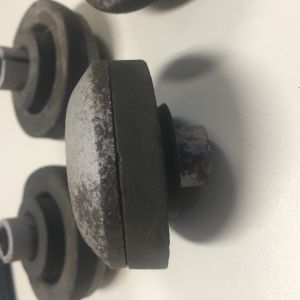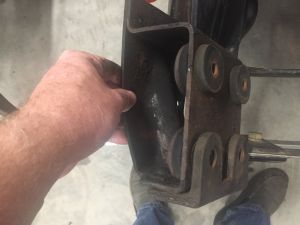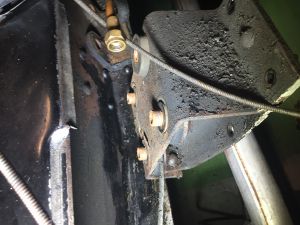- Home
- About Us
- Join/Renew
- Member Benefits
- Member Pages
- Log In
- Help
- Museum Store
No doubt the ad appeared in one or more trade magazines of the construction industry. I research ephemera of personal interest and have been amazed at what can be found on the internet.
I own a Southwind heater. They were made by Stewart-Warner and millions were sold. They worked great and there was no risk from the operation of the unit. It took gasoline from the float bowl of the carb, and the products of combustion were taken into the intake manifold. They are commonly sold on Ebay and at swap meets, but almost never with the gasoline supply tube, and it will not work without it. It is much more than just a tube.
Just
Imagine the value of almost instant heat rather than waiting for the engine coolant to get to temperature, in a cold winter.
I looked more closely at my ‘31 today. I am convinced it had an accessory hot water heater at one time.
My Series 80 has a port with a sliding door in the firewall, suggesting it once had a exhaust manifold heater such as a “Franciscoâ€. I have encountered the usual mix of vintage heaters at swap meets: Hershey, et al and when I find the right one I eill het started. As stated, I may never need a heater.
I wondered why, when the option of automatic transmissions appeared, it was not unusual for the engine in the automatic-equipped car to be rated a little higher in HP. I concluded that perhaps it was desirable to have a little more output to compensate for the effect of the automatic, and this was possible because the firing pressure could be increased without compromising engine life due to the fact there would be no lugging possible with an automatic.
We operate many old, large-bore gas engine-compressor units, which are equipped with relatively thick Babbitted bearings. Our experience is that thick Babbitt has less fatigue life and will crack and flake out. Bonding when the Babbitt is poured is also critical. Newer machines with higher speeds and firing pressures went toward thinner Babbitt, and even solid aluminum bearings. The latest higher-speed engines are equipped with steel-backed trimetal bearings with almost no Babbitt. They have to be just about perfect but will run very reliably. They wreck fast and hard, though.
Very realistic appraisal I think. I am rebuilding the engine in the ‘31 because I want a reliable driver. It had two different-design pistons and cracked Babbitt it the two rods I looked at, and obvious crank journal wear. I seriously doubt it will ever see enough use to wear out; rather it will be subject to deterioration due to sitting unused and due to time.
Looked at my ‘31’s radiator; it’s the same as the pic posted on Dec 1 with a notch in the tank to
Make room for the link ; shutterstat looks identical also.
Looks the same as the unit in my ‘31
I got a welder to run a small bead over a pinhole on my Series 80’s cover wheh she sprang a lead. Ta da! No more leak
Just a suggestion
An update to my investigation of the bypass oil filtration issue:
I examined the copper piping which served as the oil inlet and outlet on my ’31. There were no orifices, only normal brass tube fittings. I then checked the filter element: an AC P-21 painted blue with red logo, etc. and stamped INLET and OUTLET at the appropriate end. I poured thin solvent into each end and it would flow freely into the filter at the inlet port, but I could get practically none to pass into the outlet port. Then I poured about two cups into the inlet; after a few seconds passed the oil-solvent mix began to dribble out the outlet port. I turned the filter over and oil would pour out the inlet port. It became clear that the filter itself has a restriction on the outlet side.
Next I plan to cut the filter open to see what’s inside.
Thanks, Greg, you answered my next question in advance. I did not know if the restriction was on the (disposable) filter or in the fittings, but I have not found one in the fittings.
A vendor offers a very nice bypass filter replacement for a Ford 8n tractor, and it does have an orifice. I do not trust NOS filters so I am exploring what to do here. I have seen the hidden conversions, but no information about if they have an origice.
I specifically recall the Franz filters get much smaller particles than a full-flow filter and they used to use a roll of TP. They have purpose-made filter elements now though. There have been many aftermarket filter devices over the years. As my car will be a driver I am not ashamed to use a full-flow filter.
This is Sean Ornduff’s Car. I saw it at Kerrville in 2016. It ran great but needs a paint buff…
Related question: If the battery cables were connected the other (i.e. wrong) way, would anything still work? Would anything be damaged?
1904…hummm. LONDON-BRIGHTON!
if each has 150 HPO @ X rpm, yes, AT that RPM.
The steel bracked, post-clean:

Update: I have cleaned the mount up via glass bead blast; the rubber parts are a little more elaborate than I first thought.
They have typical features of a vibration isolation mount.
I was anle to read a number on one of the parts: 158449. Another number (18) is I think maybe a mold number.

Thanks, I will check there!

I know: first item on the PAS Forum parts list.
Just replace it, right?
I understood this to be the case, but when I got into my car, the parts I found are different from the Ford flathead parts. I have a ziploc bag of round rubbers labeled 1931 Pierce 8 but there is no way the parts inside will fit my Car.

